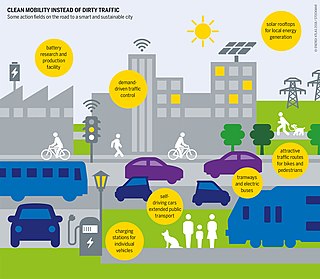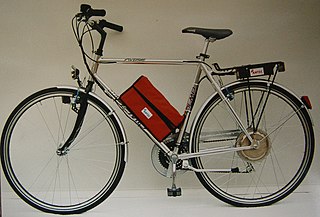
A bicycle, also called a pedal cycle, bike, push-bike or cycle, is a human-powered or motor-powered assisted, pedal-driven, single-track vehicle, having two wheels attached to a frame, one behind the other. A bicycle rider is called a cyclist, or bicyclist.

Mountain biking is a sport of riding bicycles off-road, often over rough terrain, usually using specially designed mountain bikes. Mountain bikes share similarities with other bikes but incorporate features designed to enhance durability and performance in rough terrain, such as air or coil-sprung shocks used as suspension, larger and wider wheels and tires, stronger frame materials, and mechanically or hydraulically actuated disc brakes. Mountain biking can generally be broken down into five distinct categories: cross country, trail riding, all mountain, downhill, and freeride.

Sustainable transport refers to ways of transportation that are sustainable in terms of their social and environmental impacts. Components for evaluating sustainability include the particular vehicles used for road, water or air transport; the source of energy; and the infrastructure used to accommodate the transport. Transport operations and logistics as well as transit-oriented development are also involved in evaluation. Transportation sustainability is largely being measured by transportation system effectiveness and efficiency as well as the environmental and climate impacts of the system. Transport systems have significant impacts on the environment, accounting for between 20% and 25% of world energy consumption and carbon dioxide emissions. The majority of the emissions, almost 97%, came from direct burning of fossil fuels. In 2019, about 95% of the fuel came from fossil sources. The main source of greenhouse gas emissions in the European Union is transportation. In 2019 it contributes to about 31% of global emissions and 24% of emissions in the EU. In addition, up to the COVID-19 pandemic, emissions have only increased in this one sector. Greenhouse gas emissions from transport are increasing at a faster rate than any other energy using sector. Road transport is also a major contributor to local air pollution and smog.

Vehicles that have two wheels and require balancing by the rider date back to the early 19th century. The first means of transport making use of two wheels arranged consecutively, and thus the archetype of the bicycle, was the German draisine dating back to 1817. The term bicycle was coined in France in the 1860s, and the descriptive title "penny farthing", used to describe an "ordinary bicycle", is a 19th-century term.

An electric bicycle is a motorized bicycle with an integrated electric motor used to assist propulsion. Many kinds of e-bikes are available worldwide, but they generally fall into two broad categories: bikes that assist the rider's pedal-power and bikes that add a throttle, integrating moped-style functionality. Both retain the ability to be pedaled by the rider and are therefore not electric motorcycles. E-bikes use rechargeable batteries and typically are motor-powered up to 25 to 32 km/h. High-powered varieties can often travel more than 45 km/h (28 mph).
The Bicycle Museum of America is a museum in New Bremen, Ohio, USA. The museum is one of the largest private collections of bicycles in the world.

Transportation Alternatives is a non-profit organization in New York City which works to change New York City's transportation priorities to encourage and increase non-polluting, quiet, city-friendly travel and decrease automobile use. TransAlt seeks a transportation system based on a "Green Transportation Hierarchy" giving preference to modes of travel based on their relative benefits and costs to society. To achieve these goals, T.A. works in five areas: Cycling, Walking and Traffic Calming, Car-Free Parks, Safe Streets and Sustainable Transportation. Promotional activities include large group bicycle rides.

The International Mountain Bicycling Association (IMBA) is a non-profit educational association whose mission is to create, enhance and preserve trail opportunities for mountain bikers worldwide.
Jim Newberry was mayor of Lexington, Kentucky from December 31, 2006, until January 2, 2011. He defeated incumbent mayor Teresa Isaac by the largest vote margin in the history of Lexington-Fayette's merged "Urban County" government. This was also the first time in Lexington-Fayette history that a challenger had defeated a sitting mayor.

A bicycle parking rack, usually shortened to bike rack and also called a bicycle stand, is a device to which bicycles can be securely attached for parking purposes. A bike rack may be free standing or it may be securely attached to the ground or some stationary object such as a building. Indoor bike racks are commonly used for private bicycle parking, while outdoor bike racks are often used in commercial areas. General styles of racks include the Inverted U, Serpentine, Bollard, Grid, and Decorative. The most effective and secure bike racks are those that can secure both wheels and the frame of the bicycle, using a bicycle lock.
Bikes Not Bombs is a Boston, Massachusetts based nonprofit that uses the bicycle as a vehicle for social change by recycling donated bicycles, training young people to fix their own bikes and become employable mechanics and sending thousands of bicycles to international partner communities in countries such as Uganda, Ghana, St. Kitts & Nevis, El Salvador, Sierra Leone, Guatemala, Kenya, and Rwanda. The organization was founded in 1984 by Carl Kurz, a bicycle mechanic and Michael Replogle, a Maryland-based transportation planner. Bikes Not Bombs provided bicycles and bicycle parts to Nicaragua in opposition to the Reagan administration's support for the Contra War, and in solidarity with the Nicaraguan people and in resistance to the U.S. trade embargo against Nicaragua in effect at the time. Mira Brown became involved with BNB's work while in Nicaragua and later became the organization's first Executive Director.

Human power is work or energy that is produced from the human body. It can also refer to the power of a human. Power comes primarily from muscles, but body heat is also used to do work like warming shelters, food, or other humans.

World Bicycle Relief is an international, non-profit organization based in Chicago, IL that specializes in large-scale, comprehensive bicycle distribution programs to aid poverty relief in developing countries around the world. Their programs focus primarily on education, economic development, and health care. As of February 2020, World Bicycle Relief has distributed 500,000 bicycles in 21 countries and trained more than 2,300 bicycle mechanics in the developing world. Within their largest program, the Bicycles For Educational Empowerment program, nearly 70 percent of the student bicycles are designated for girl students.
Ecovolis is a community based bike sharing program in Tirana, Albania, launched on March 22, 2011, from an environmental NGO called Social Stimulating Alternatives Program (PASS). The system is based on 6 bike stations, respectively staffed by two employees in two shifts. Ecovolis program has proven successful in significantly increasing bicycle use in Tirana.

Time's Up! Environmental Organization was founded in 1987 to help educate New Yorkers about environmental awareness. One of its main focuses is to promote non-polluting transportation, by advocating bicycling.

The Moving Ahead for Progress in the 21st Century Act (MAP-21) is a funding and authorization bill to govern United States federal surface transportation spending. It was passed by Congress on June 29, 2012, and President Barack Obama signed it on July 6. The vote was 373–52 in the House of Representatives and 74–19 in the Senate.

Bicycle poverty reduction is the concept that access to bicycles and the transportation infrastructure to support them can dramatically reduce poverty. This has been demonstrated in various pilot projects in South Asia and Africa. Experiments done in Africa and Sri Lanka on hundreds of households have shown that a bicycle can increase the income of a poor family by as much as 35%.
Reusable packaging is manufactured of durable materials and is specifically designed for multiple trips and extended life. A reusable package or container is "designed for reuse without impairment of its protective function." The term returnable is sometimes used interchangeably but it can also include returning packages or components for other than reuse: recycling, disposal, incineration, etc. Typically, the materials used to make returnable packaging include steel, wood, polypropylene sheets or other plastic materials.
Sustainable Materials Management is a systemic approach to using and reusing materials more productively over their entire lifecycles. It represents a change in how a society thinks about the use of natural resources and environmental protection. By looking at a product's entire lifecycle new opportunities can be found to reduce environmental impacts, conserve resources, and reduce costs.












